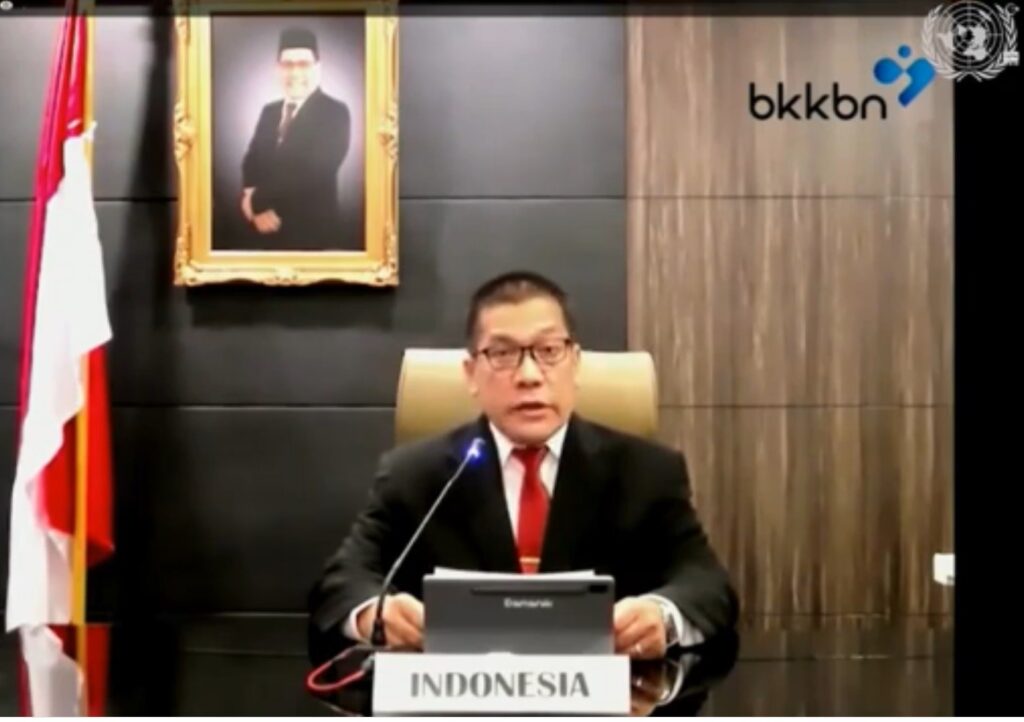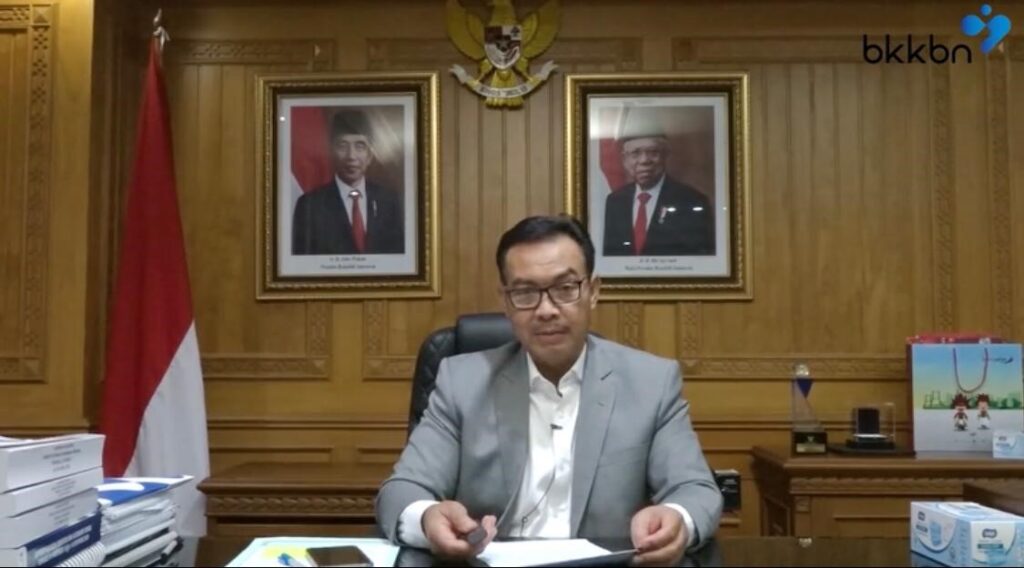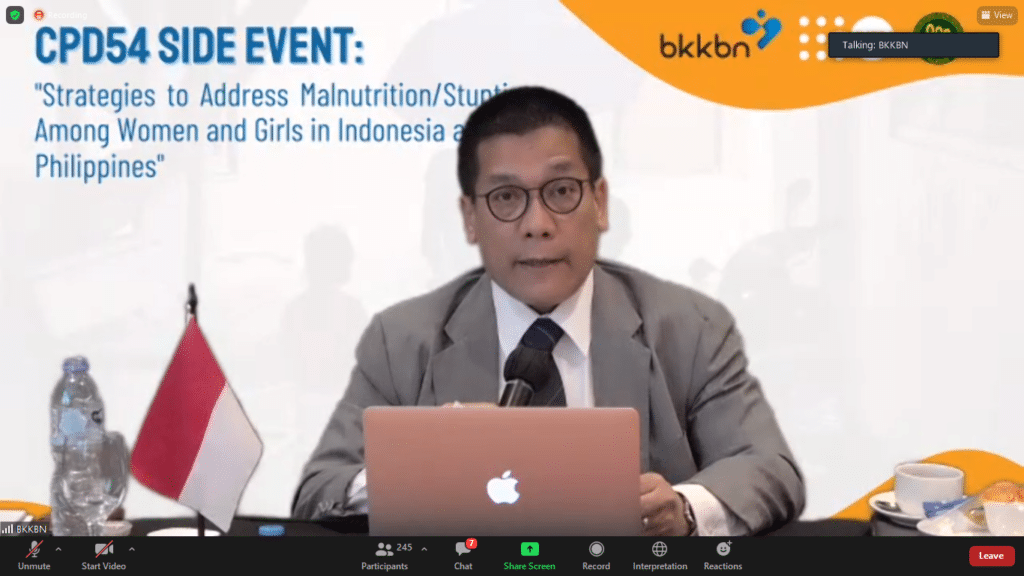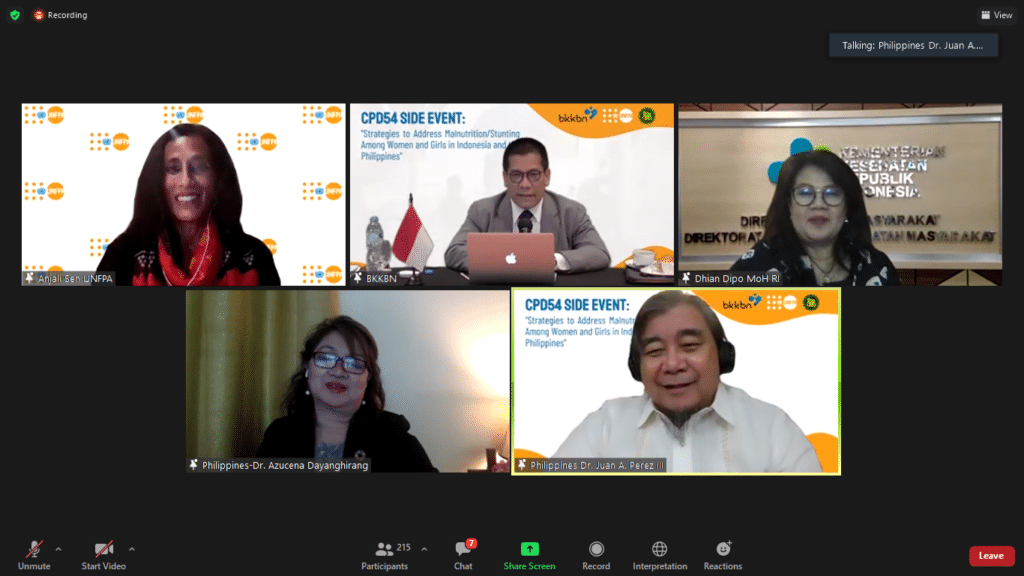
Press Release
Commission on Population and Development (CPD) Fifty-fourth session and
Joint Virtual Side Event “Strategies to Address Malnutrition/Stunting Among Women and Girls in Indonesia and the Philippines”
The United Nations Commission on Population and Development (CPD) has organized its 54th session with a focus on “Population, Food Security, Nutrition, and Sustainable Development”, from April 19 to 23, 2021 in New York, United States of America. The Deputy for Training, Research, and Development of the National Population and Family Planning Board of the Republic of Indonesia (NPFPB/BKKBN), His Excellency Prof. Rizal Damanik, Ph.D. who led the Indonesian delegate took an active part in the session. On the occasion, Prof. Damanik conveyed Indonesia’s achievements and strategies in addressing several things related to the theme, as follows:
- Indonesia has established a set of legal frameworks related to food and nutrition security, as well as population, reproductive health, and family planning. The implementation of food and nutrition security programs has resulted in Indonesia’s improvement in the Global Hunger Index, from a serious level in 2012 to a moderate level in 2020. Indonesia is also currently implementing strategic priority projects to address these issues, including accelerating stunting and maternal mortality reduction in 2024.
- The Government of Indonesia also focused on Adolescent Reproductive Health through education and services. Prof Rizal Damanik mentioned that the education programme consists of three primary interventions, namely the establishment of centres of information and counselling for adolescents, integration in school curricula, and involvement of the private sector and other potential partners, both in education and services. The programme has been able to reduce Age-Specific Fertility Rate for the 15-19 age group in 2017. He believes that Indonesia could reduce the rate by 2024.
- Reducing the percentage of child marriage in 2024 is also part of Indonesia’s national agenda. Indonesia has revised the Law on marriage. The amendment raises the minimum age for first marriage and omits the minimum age difference between boys and girls. Today, the minimum age for first marriage in Indonesia for boys and girls is 19 years old, an improvement from 19 and 16 years for boys and young girls respectively. Besides, Indonesia has also developed a National Strategy on the Prevention of Child Marriage consisting of five strategies, namely: 1) Optimizing Capacity of Children; 2) Providing Environment; 3) Accessibility and Service Expansion; 4) Strengthening Regulations and Institutions, and 5) Strengthening Stakeholder Coordination.
CPD itself is an intergovernmental forum at the United Nations that discusses efforts to advance population and development issues. In this CPD’s forum, the Indonesian delegation was represented by BKKBN, Ministry of Foreign Affairs, BAPPENAS, Ministry of Health, and the Food Security Agency including the Permanent Representative of Indonesia to the United Nations in New York. The meeting will produce an action plan to be followed up by countries participated in the meeting.
On the sidelines of the 54th sessions, the Government of Indonesia and the Government of the Philippines supported by the United Nations Population Fund (UNFPA) has organized a joint virtual side event with the theme “Strategies to Address Malnutrition/Stunting Among Women and Girls in Indonesia and the Philippines” on Thursday, 22 April 2021. Indonesia and the Philippines have undertaken its South-South and Triangular Cooperation in the area of population dynamics, reproductive health, and gender equality since 2012. The first Memorandum of Understanding (MoU) between the two countries has been implemented well by the two countries for a period of 5 years. The MoU was then extended in 2019 for another three years, up to 2022. Considering the strong relationship between malnutrition especially stunting among women and girls and reproductive health, family planning, including child marriage, it is important for exchange knowledge, discuss and share the current status of stunting and some lessons learned and strategies on how to address stunting in both countries.

His Excellency Dr. Hasto Wardoyo, the Chairperson of NPFPB/BKKBN with UNFPA Regional Director – Mr. Bjorn Andersson, and Mr. Arthur Erken – UNFPA Policy and Strategy Division Director UN Head Quarters, as well as Mr. Juan Antonio A. Perrez – Executive Director Commission on Population and Development of Philippines, delivered the opening statement on the opening session of the Joint Virtual Side Event. In general, the opening statements have stressed the importance of taking action to address Malnutrition and stunting among women and girls. Malnutrition will impact not only the health of the women, girls, young people, and other family members, including maternal health but also child development. Malnutrition also reduces resistance to illness resulting in populations with poor health and poverty.

The Event further provides knowledge to participants. Four Panelists from Indonesia and the Philippine side have shared their knowledge and strategies to Address Malnutrition in the two countries. The Panelists were Prof. Rizal Damanik, Ph.D. – the Deputy for Training, Research, and Development who address the stunting alleviation program in Indonesia, Dr. Alejandro N. Herrin – Consultant Philippines who present the Reaping Economic and Social Gains Through Addressing Reproductive Health and Maternal and Child Nutrition: A Conceptual Framework. Dr. Dhian Proboyekti – Director for community Nutrition, Ministry of Health of Indonesia and Dr. Azucena M. Dayanghirang – Executive Director of the National Nutrition Council, Philippines who provide information on stunting among women and girls with different socio-economic background: current status, influencing factors, and strategies to address both in Indonesia and Philippines.

This Joint Virtual Side Event was moderated by Ms. Anjali Sen, UNFPA Indonesia and was attended by more than 300 participants both from Indonesia and other country, especially CPD member countries.